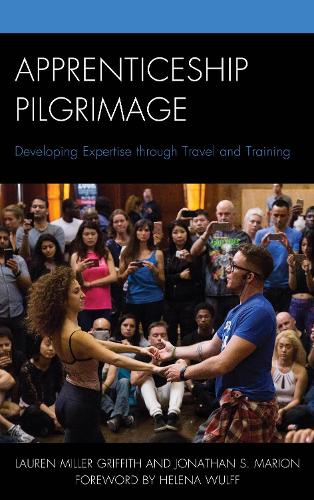
Apprenticeship Pilgrimage: Developing Expertise through Travel and Training
(Hardback)
Publishing Details
Apprenticeship Pilgrimage: Developing Expertise through Travel and Training
By (Author) Lauren Elizabeth Miller
By (author) Jonathan S. Marion
Foreword by Helena Wulff
Bloomsbury Publishing PLC
Lexington Books
29th December 2017
United States
Classifications
Professional and Scholarly
Non Fiction
Educational strategies and policy
Society and culture: general
Anthropology
704.949306
Winner of 2018 Winner of the Edward M. Bruner Book Award from the Anthropology of Tourism Interest Group 2018
Physical Properties
Hardback
202
Width 159mm, Height 237mm, Spine 22mm
490g
Description
Lauren Miller Griffith and Jonathan S. Marion introduce the concept of apprenticeship pilgrimage to help explain why performers travel to places both near and far in an attempt to increase both their skill and their legitimacy within various genres of art and activity. What happens when your skill-level surpasses local training opportunities, whether in dance, martial arts, or other skills and practices Apprenticeship Pilgrimage provides a new and exciting model of apprenticeship pilgrimagesincluding local, regional, opportunistic, and virtualthat practitioners undertake to develop embodied knowledge, skills, and legitimacy unavailable at home. For most people, there is a limit to how much training is available from the teachers and classes at home. As skill and know-how increase, the resources and training opportunities available become limits on ones learning. Similarly, a practitioners legitimacy may be suspect without exposure to appropriate cultural context, such as ties with the homeland of certain dance forms or martial arts. Whether for skill alone, or activity-specific legitimacy, individuals may feel compelled to travel for training. Such travelers see themselves quite differently from other tourists, and the seriousness with which they pursue their journeys makes it appropriate to call them pilgrims. Given the goal of learning from and developing their own skills by training with experts at their destinations, apprenticeship pilgrims is even more appropriate. Rather than focus on specific geographic regions or genres of apprenticeship, this book builds a robust theoretical framework for understanding the role of travel for developing expertise in embodied genres. This book links and expands on the existing scholarship concerning anthropologies of education and tourism, but takes new strides in exploring the global circumstances wherein skill development requires travel. Throughout, the authors use apprenticeship pilgrimage as a robust new framework for considering the interrelated roles of going, learning, and doing for identity construction within contemporary globalization.
Reviews
Apprenticeship Pilgrimage presents an exciting new theoretical roadmap for understanding travel to develop embodied expertise. Drawing on participant observation and deft analyses of interviews with capoeira practitioners, ballroom dancers, and students of martial arts who travel to gain embodied knowledge and legitimacy in their chosen activities, Griffith and Marions book is theoretically sophisticated, wonderfully insightful, and engagingly written. This is a volume that merits a place on the must read list of all students and scholars of tourism and mobility studies, expressive culture and dance. -- Kathleen M. Adams, Loyola University Chicago; author of Art as Politics: Recrafting Identities, Tourism and Power in Tana Toraja, Indonesia
InApprenticeship Pilgrimage:Developing Expertise through Travel and Training, Griffith and Marion theorize that traveling to enhance physical skill transforms the pilgrims sense of self and improves his or her status in a community of practice, increasing social connections and perceived expertise. The authors rely on personal experiences, and those of othercapoeiristasand ballroom dancers, as well as yoga practitioners and martial artists, and richly examine existing literature in travel studies, performance studies, and anthropology. Among the books many strengths are the authors thoughtful treatment of the economic and cultural tensions of educational travel and a history of such pilgrimages, from guild-related tramping, to the Victorian grand tour, and to contemporary study abroad. -- Ann Dils, The University of North Carolina at Charlotte
Author Bio
Lauren Miller Griffith is assistant professor of anthropology at Texas Tech University. Jonathan S. Marion is associate professor of anthropology at the University of Arkansas, president of the Society for Humanistic Anthropology, and a past president of the Society for Visual Anthropology.
